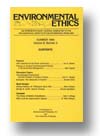|
news and notes |
|
1.
|
Environmental Ethics:
Volume >
8 >
Issue: 2
NEWS AND NOTES (1)
view |
rights & permissions
| cited by
|
|
|
|
|
features |
|
2.
|
Environmental Ethics:
Volume >
8 >
Issue: 2
Jon N. Moline
Aldo Leopold and the Moral Community
abstract |
view |
rights & permissions
| cited by
Aldo Leopold’s land ethic calls for an extension of ethical consideration to nonhuman components of the complex system he called “the land.” Although the basis for this extension was holistic, interpretations of Leopold’s holism leave one baffled at how he could see his land ethic as an extension of a system which recognizes individual human rights. Leopold’s critics and exponents alike have focused on the holism expressed in his definition of right and wrong. Both regard it as a working criterion of morality to be applied directly to conduct, act by act. Both are mistaken. Leopold was an indirect holist, not a direct one. That is, he applied his holistic definition of right and wrong not as a role for judging conduct directly, case by case, but as a principle for judging conduct only indirectly by judging the roles, tastes, predilections, practices, and attitudes which influence it.
|
|
|
|
|
3.
|
Environmental Ethics:
Volume >
8 >
Issue: 2
Mark Sagoff
Process or Product? Environmental Priorities in Environmental Management
abstract |
view |
rights & permissions
| cited by
Surplus-not simply scarcity-provides a reason to preserve the natural environment. Although advances in biotechnology have made it possible to manipulate, alter, and replace ecological and evolutionary processes in order vastly to increase the production of economically valuable commodities, e.g., seafood in estuaries, the huge surpluses likely to result threaten fishing communities with the same economicdepression and social dislocation that farming communities have already experienced. In this context, protecting the biological status quo not only expresses an admirable affection and respect for nature, but also makes economic sense by taking unneeded resources out of production.
|
|
|
|
|
discussion papers |
|
4.
|
Environmental Ethics:
Volume >
8 >
Issue: 2
John F. Haught
The Emergent Environment and the Problem of Cosmic Purpose
abstract |
view |
rights & permissions
| cited by
Gur general vision of the world will undoubtedly affect our environmental ethics. Scientific materialism is the “general vision” that undergirds many scholarly and popular presentations of science today. It is questionable whether this materialist metaphysics can consistently sustain an environmental concern. If scientists influenced by the materialistic outlook, nonetheless, happen to be environmentalists, itis in spite of and not because of their materialist philosophies of nature. What we need, therefore, is a cosmological vision that is nlore consistently supportive of an environmental ethic. Religious visions are often ambiguous in their attitude toward the natural environment. Alfred North Whitehead and his followers weave modem science, philosophical sophistication and religious cosmology into a metaphysical vision fully and consistently supportive of a vigorous environmental ethic.
|
|
|
|
|
5.
|
Environmental Ethics:
Volume >
8 >
Issue: 2
Donald Davis
Ecosophy:
The Seduction of Sophia?
abstract |
view |
rights & permissions
| cited by
In this paper I challenge the reader to witness the environmental and feminist aegis as an epicine confrontation with nature whose main goal is to reconcile a lost partnership with the archetype I have labeled Sophia. Sophia, whose providential origins lie somewhere amid the great pre-Hellenic gnostic cults, can only bring salvation if she is liberated by humanity through the resacralization of nature. It is this change in consciousness that points toward a radical environnlental ethic and a total reconceptualization of the becoming process.
|
|
|
|
|
book reviews |
|
6.
|
Environmental Ethics:
Volume >
8 >
Issue: 2
Allen Carlson
Philosophy Gone Wild
view |
rights & permissions
| cited by
|
|
|
|
|
7.
|
Environmental Ethics:
Volume >
8 >
Issue: 2
Donald Gustafson
Animal Thinking
view |
rights & permissions
| cited by
|
|
|
|
|
comment |
|
8.
|
Environmental Ethics:
Volume >
8 >
Issue: 2
Carl A. Strang
The Ethics of Wildlife Rehabilitation
view |
rights & permissions
| cited by
|
|
|
|
|
9.
|
Environmental Ethics:
Volume >
8 >
Issue: 2
R. Wills Flowers
Ethics and the Hypermodern Species
view |
rights & permissions
| cited by
|
|
|
|
|
news and notes |
|
10.
|
Environmental Ethics:
Volume >
8 >
Issue: 2
NEWS AND NOTES (2)
view |
rights & permissions
| cited by
|
|
|
|
